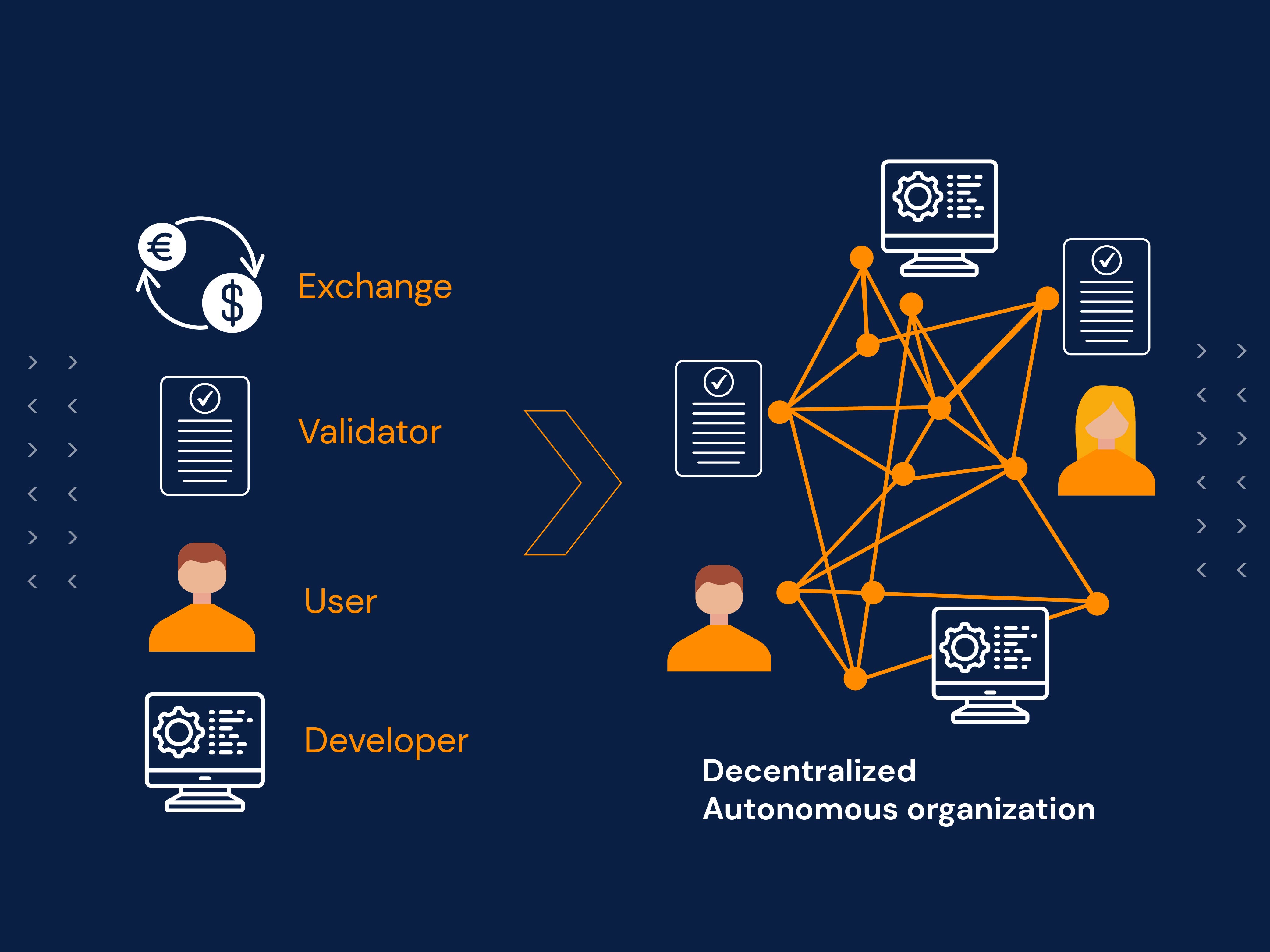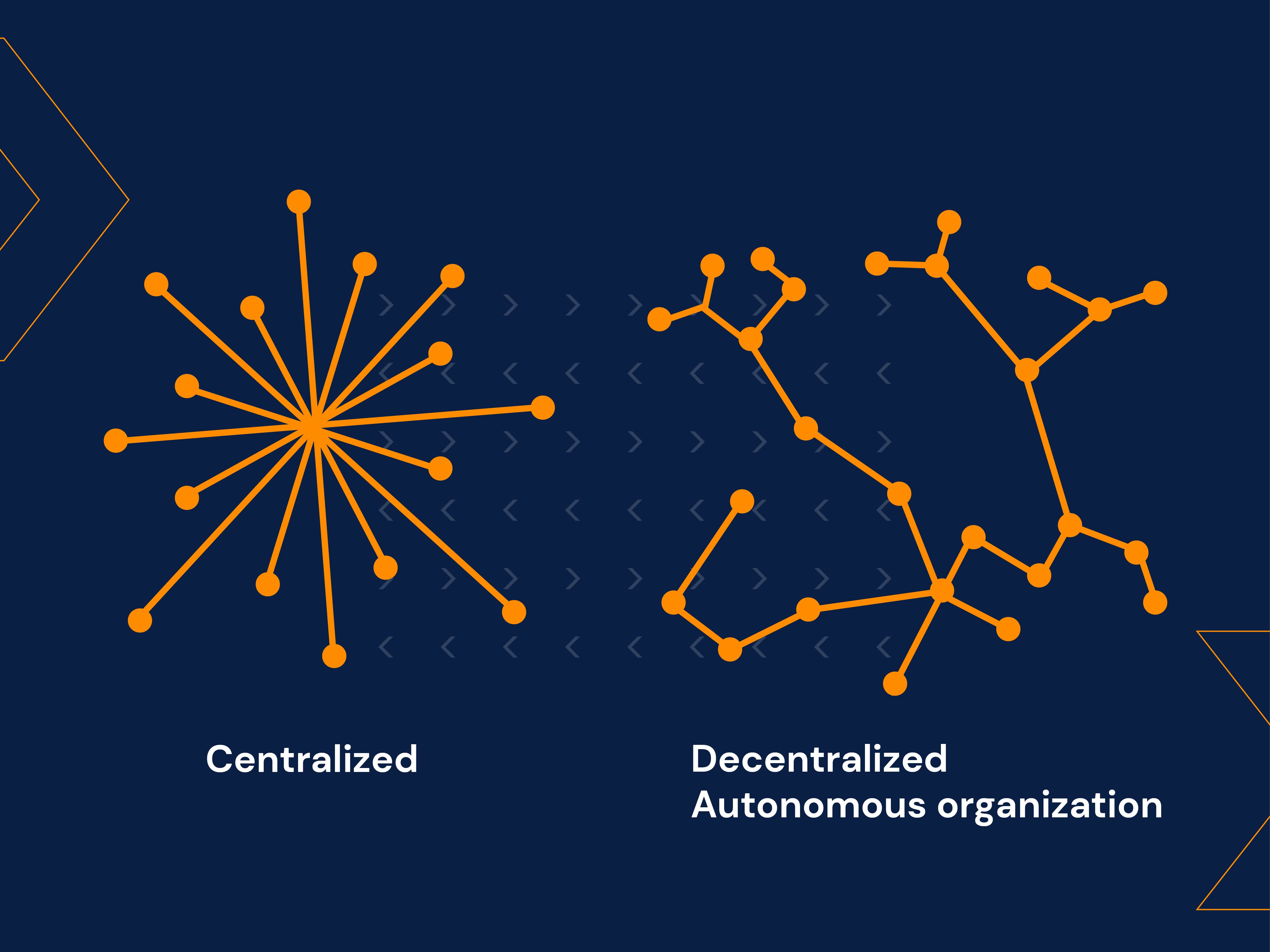What is a DAO?
Have you thought about what it would be like for your organization to make decisions from a non-hierarchical standpoint? What if current and past staff had an opportunity to partake in the management of your company’s shared resources, over a decentralized virtual network? Decentralized Autonomous Organizations (DAOs), explore this potential and more.
As a distributed network of autonomous stakeholders, a DAO is a democratic governing mechanism that functions based upon the rules set forth by the stakeholders. The rules that are created in a DAO are like a company’s business plan, are self-enforcing, and are coded via smart contracts. In this sense, all of the traditional business functions of a company could potentially be replicated as a smart contract, forming a complex interrelated web of smart contracts.

Why is Admios Exploring Becoming a DAO?
Admios recognizes the importance of staff having a voice and stake in company decisions that impact the success of staff, and the company. Admios is exploring the idea of creating a DAO to see if this could be used as a tool for staff to unlock their full decision making potential while accruing monetary value via tokens. Enabling staff to maximize their level of agency in their professional and personal growth is a critical goal for Admios.
Have Any Other Companies Made this Transition?
Currently, there is a diversity of DAOs fulfilling distinct objectives. Dash, recognized as an open source cryptocurrency, is a DAO that is managed by a subset of its participants, known as “masternodes.” Owners of masternodes have voting rights, and can be viewed as shareholders since they vote on new propositions that impact the future of the organization. In this model, masternodes are eligible to receive a dividend of 45% of all newly generated Dash. Since a DAO lacks a central authority, Dash allocates 10% of all newly generated Dash to the DAO treasury, which is overseen by the DAO, and all shareholders can submit ideas for how to manage the funds. Dash’s specific rules and protocols about how to manage the funds and its approval process are all embedded in code that has been agreed upon by all shareholders, and run autonomously. One of Dash’s key characteristics include privatesend, which permits participants to pay anonymously.
DAO enthusiasts and supporters continue to actively seek use cases. Aspirations range from using DAOs as a means to optimize efficiency gains, potentially growing Gross Domestic Product (GDP), to completely decentralized economies.The tracking of merchandise, enhancing healthcare, and offering lending opportunities, are other areas that a variety of existing DAOs are tackling. DAOs are shedding light on what an evolution in an economic organization could look like.

Here is Our Current Thinking Behind This Initiative
The Pros
One of the main advantages of a DAO is that it runs decentralized. A DAO is decentralized in the sense that the interests of key stakeholders and beneficiaries can be collectively coordinated in a single system, without the need for centralization or third-parties.
Staff can accrue real-world value via tokens. Tokens can be created to carry monetary value and/or represent assets. A DAO can function like a corporation, facilitate cryptocurrency transactions, and synchronize with non-fungible tokens (NFTs). DAO-NFT collectives are particularly intriguing since DAO tokens can gain real-world value through the backing of NFTs. If NFTs have value, so do DAO tokens.
Democratic consensus is reached through voting. A DAO treasury issues tokens to those interested in joining the DAO. Those who join become stakeholders and token holders. As a token holder, tokens can be used to vote on a variety of issues faced by the company in real-time and transparently. Token holders with more tokens have more weightage in decision making about issues impacting the organization. Those who support the DAO can be eligible to receive tokens in return for their support, which could include support from past staff that have moved on from Admios, for example.
A DAO operates autonomously,which is key if and when tension or friction arises between stakeholders and/or beneficiaries. A DAO’s implementation of governance decisions in the business plan run without issue or interruption. In this respect, a DAO can facilitate a self-governing ecosystem since all shareholders are governed by a smart contract.
As a multinational company, Admios and its customers could benefit from a DAO's automation capabilities.Through smart contracts, a DAO can automate essential and non-essential processes. These include tasks such as the sending and paying of invoices. Smart contracts can also assist in the tracking of product and project progress, delivery, and/or shipment. Client information can be extracted from a CRM system. Payments can be executed in cryptocurrency. A company’s inventory can be shared in the DAO, which could grant Admios a way to keep track of software developers and projects, for instance.
Lastly, DAOs are described as cost-effective and fair business models since the principal objective of a DAO is to protect the business itself without profits, salaries, employee status, and other aspects interfering. DAOs can be created for any type of collective work or common purpose. Technology exists to craft a DAO that is easily accessible, straightforward, and scalable.A DAO can link to other DAOs, and as a DAO’s network grows, it’s member entities benefit as well. DAOStack is a great example of this.
The Cons
In many respects, fully functioning DAOs are yet to materialize. The technology to scale DAOs is nascent, at least still four years out. Many point out that access to technology such as scanners or IoT beacons is currently limited. In-depth understanding of DAOs, their full abilities, and use cases remain largely untapped.
DAOs and their self-governance is another area in need of further development. Due to the growing complex needs of organizations, identifying the best balance of governance and incentive mechanisms is tricky.The following represent an example of the kinds of questions that are pertinent to take into consideration when creating a DAO
- How should a DAO go about growing its network, while actively improving it?
- How can a just distribution of governance among shareholders be guaranteed?
- What should be done about uninvested token contributions from shareholders?
- What should happen in the event of a massive withdrawal of token contributions from shareholders?
- What is the most appropriate structure of ownership and monetary distribution?
- How can shareholders have an equitable share in the financial, material, and/or social capital that is created by them?
- What should the parameters in decision making and voting be?
Security vulnerabilities raise an additional concern when it comes to DAOs. At its inception, the first DAOs ran into code issues which led to them being hacked and exploited.A well-known example is The DAO, a form of investor-directed venture capital fund founded in 2016 that got hacked. The DAO collected a remarkable USD $150 Million, with over 18,000 investors. Hackers gained entry into the DAO and stole $50 Million worth of Ethereum. In order to restore the funds, Ethereum had to initiate a hard fork, which we now have Ethereum and Ethereum Classic. The hack was eliminated in Ethereum. This event negatively impacted the image of DAOs for some time. The idea of DAOs have made a comeback, and now it is a matter of finding how to best debug the code for DAOs, and strengthen their level of security.
Where Are We Now?
Admios is in the preliminary stages of investigating the technical, labor, legal, tax and other relevant regulatory information related to DAOs. While our company mission remains constant to empower all our employees in decision making and financial reward, we must first evaluate whether a DAO is a suitable mechanism for achieving this goal.


